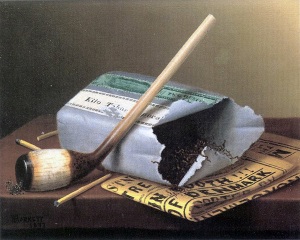Your story, “Running,” has such a straight forward, yet seductive voice. I love the way this piece puts me into the story so quickly and how easy to read it is. I can go through it and live it with no effort to parse it out, and yet it still has a kick.
This was one of the first stories I ever wrote. In truth it just came to me. I was messing around on the Internet and I saw this contest. It said to write a story about running. The first line just came to me. “My uncle was a high school track star.”
The rest of the story came out. If you ask me how I constructed the story, my answer is I have no clue. I was reading a lot of Sherman Alexie at the time. I’m pretty sure his writing influenced the style of this story. Later I discovered when I reread the guidelines for the contest, it was supposed to be a true story. I tucked the story away and there it sat for years. I didn’t write anything after that.
So this story has been written for a while. What prompted you to find it and send it along to us?
I wrote the story you published and stuck in an old shoebox for years. My husband found it and read it. I was annoyed with him, but he loved it. He said I should try writing. I joined an online writing group and that was amazing. I was able to get true critiques for my work. I live in such a small rural place the Internet has really given me avenues to explore I wouldn’t normally have. I don’t really tell anybody. Sometimes I write about things that maybe tribal members would get upset about. I feel more free to write not as myself.
Love the sixth paragraph about the prayers, how the family pins their hopes on the uncle, and only indirectly deal with their tragedies. People do this. It is a way to deal with grief.
I think so. I think it’s like—well—On the rez we can feel powerless about our lives. There is so much crap that happens around us, so when someone shows a little bit of greatness, we can feel pride in that person. We live vicariously through that person. His or her greatness is ours.
It crushes us all if they fail. It reminds us of our own broken dreams. Maybe it’s not fair, but we are a “tribal” society and in some way, all of us belong to each other.
Here too, the narrative shifts in just the right place. The narrator puts them in the car and binds them to the first part of the story with the narrator’s question: “How come you can run so fast?” This opens the reader’s focus to the whole issue of this community. You bring this community to life. Can you talk about that a little?
For this I thought about growing up on the rez, coming to terms with this place that I know and love. As I grew up, I had to reconcile what I loved with all the really ugly stuff that goes on. I put myself back in my childhood.
The genesis of this story, did you come to it with a specific character in mind or did it start with setting?
I came up with the first line. It’s a true line: my uncle was a high school track star. The rest of the story followed. I guess it was the character and the line together. Most of the time there is a line or phrase that comes to me, then the rest of the story comes out. It’s a lot harder for me to think of a setting or subject and write about it.
For me, the main event of the story is the accusations about the uncle that ruin his life. This feels fresh to me here because of the way it written, in a kind of unexpected way. How much do you think about language? Are you one of those writers who find that the words flow easily or do you have to labor to make the narrative so original and real?
I didn’t think about the language.
I find the words easier than anything else. Narrative comes kind of naturally for me. I’m not sure why that is. I wish I had the education to answer your questions better.
You mentioned to me in one of our correspondences that you are relatively new to writing. How and why did you start to write?
Most of the time when I write, I’m telling my husband a story. We—well. In my whole family we tell stories and gossip to each other all the time. I imagine I’m telling my husband a story and maybe my kids, telling them how I see our home. I tell a story like I’m talking to my family. Like I’m given the reader the inside scoop.
Tell us who you read and why.
Ugh! I don’t like this question. It intimidates me. I have been reading a lot of shorts and flash pieces in magazines. Some of them are amazing. I thought “Bus Driver” by Alex Higley was amazing. It was the story posted the week after mine. Did you read it?
I’m embarrassed at how much I loved that story. I read his little bio thing, and there was nothing there! That story was incredible. When I wrote “Running,” I had just finished reading The Lone Ranger and Tonto Fist Fight in Heaven by Sherman Alexie. I read that and realized that short stories didn’t have to have this traditional narrative. I could take a story and infuse it with poetry and prose and whatever I wanted. That was pretty exciting.
Where do you want to go from here with your writing?
I would love to go to school to make my writing more consistent. The fact that I am so untrained makes my writing hit and miss. I am just learning the craft. I write and I write and sometimes I get a story right, but I would love to be able to analyze my own story or understand what is missing in it or what made something work. I dream about going to school and learning the craft of writing, but that is not in the cards for me. I practice as much as I can. I don’t think I would have even considered writing if it wasn’t for my husband pushing me and then having access to the internet.
I mean I’m a high school drop-out. I have done some community college courses and wrote an article or two for our local newspaper. A year ago I didn’t even know what flash fiction was.
I had no idea I would like writing, but I love it. I didn’t really know that what I was doing was writing, something someone outside my family would like.
What has this discovery of writing meant to you?
I learn something new every day I write, but I’m still an amateur, maybe I always will be, but I want to be better. I have another story to tell you. My grandfather never graduated the 8th grade. He worked for PG&E around here his whole life. In his spare time, he collected shells. He traded with everybody including the Emperor of Japan. Or so the story goes. He ended up discovering seven new species of shells. When he died my family sold of big chunks of his collection to museums. I hope to be like that. I may not get an MFA, but I hope I can have my collection of stories like my grandfather had his shells.



 Included in the price of SmokeLong Fitness:
Included in the price of SmokeLong Fitness: